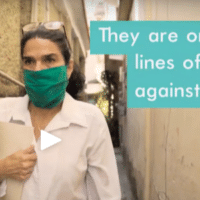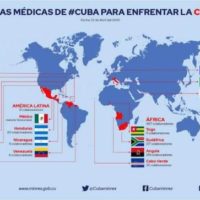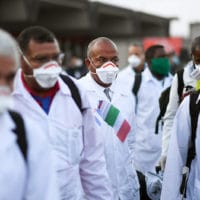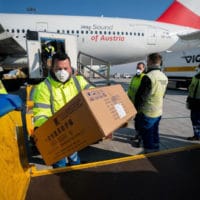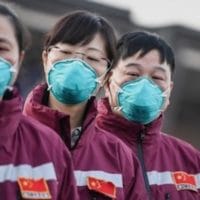-
Cuba sends medical brigade to Mexico to fight COVID-19
The second group of a Cuban medical brigade to contribute to the fight against the COVID-19 pandemic traveled to Mexico City on Thursday.
-
The voracious reader
“We do not tell the people: believe. We say: read,” a statement not made casually, but rather a public expression of a deep conviction, spoken by Fidel in 1961.
-
Che
Twenty left publishers from around the world release a joint edition including two essential texts by Che Guevara on the fifty-third anniversary of his assassination by the CIA in Bolivia.
-
Medicare-for-All is a beginning, not the end point
As a coup de grâce to the Bernie Sanders campaign Joe Biden declared that he would veto Medicare-for-All. This could drive a dedicated health care advocate to relentlessly pursue Med-4-All as a final goal.
-
Why Cuban doctors deserve the Nobel Peace Prize
U.S. allies in Latin America, such as Brazil, Bolivia, and Ecuador, expelled the Cuban medical missions. This would become a catastrophic decision for these countries as the COVID-19 pandemic developed across Latin America.
-
What media moguls don’t want you to know: Youtube and Google attack Cuba and Venezuela
On Aug. 20, just ahead of programming about the start of clinical trials for Cuba’s COVID-19 vaccine, Soberana-01, YouTube management disabled Mesa Redonda’s channel. Mesa Redonda (Roundtable) airs Monday through Friday evenings on Cuban national television.
-
Cuba’s vaccine candidate “Sovereign” is all set to enter clinical trials
Cuba’s vaccine candidate is the first from the Latin America and the Caribbean region and marks a continuation of its pioneering work in combating COVID-19 across the world.
-
Cuba and the complex relationship between the individual and the collective
When a cause is just, it will find a place within the Revolution. Perhaps this is what Fidel meant when he said that there was room for everyone in the Revolution.
-
Cuban medical internationalism has been a core component of the revolution
“If the small economy of Cuba can improve the health of millions of the world’s people, imagine what could be accomplished if America’s enormous productive capacity changed from creating useless and destructive junk to producing what people throughout the world actually need.”
-
Cuba in the last stretch of the Pandemic
Cuba is only a few days away from ending its coronavirus quarantine. Except for Havana, all the other provinces are free of the contagion and have begun moving toward a new normality.
-
A statue of Hatuey
As monuments to Columbus and confederate heroes topple and Democrats ponder which militarist they wish to glorify in their replacements, it is critical to realize that statues which go up are at least as important as the ones that come down. Perhaps the best nominee for a new statue is Hatuey, who led the first guerrilla warfare against European invasion of the western hemisphere.
-
Rubio, Cruz bill would deem Cuba’s medical missions “human trafficking operation”
In an act of pure hypocrisy and obsessive cruelty, GOP Senators Marco Rubio, Rick Scott and Ted Cruz joined together to penalize developing nations who seek to take advantage of Cuba’s hands-on humanitarian work.
-
Who deserves the Nobel Peace Prize in a time of pandemic?
A few weeks ago, I was talking to Noam Chomsky about the state of the world. At one point, Noam smiled and said that he is not aware of any German doctors in Italy, even though both countries are in the European Union; instead, Cuban and Chinese doctors went to Italy to help the Italians fight the global pandemic.
-
U.S. campaign against Cuba’s medical brigades targets healthcare, not ‘forced labor’
For decades, Cuba has sent tens of thousands of its medical professionals abroad to work in countries where natural disasters or poverty have left people without healthcare. In the midst of the COVID-19 pandemic, and the catastrophic U.S. response to it, the absurdity of a propaganda war against Cuban medical missions has become more obvious than ever. But you can’t rely on corporate media to explain why.
-
Can We Simultaneously Oppose Bayer/Monsanto’s Biotechnology and Support Cuba’s Interferon Alpha 2B?
Technology reflects social factors throughout its development and use. Genetically engineered crops allow mega-corporations to patent seeds, lure farmers into buying them with visions of high yields, and then destroy small farmers. Cuba’s drugs are shared throughout the world. Making a distinction between the biotechnology of agro-industry and Cuba requires understanding the difference between bioimperialism and biosolidarity.
-
Another life-saving brigade travels to South Africa
More than 1,450 men and women in white lab coats from Cuba’s Henry Reeve Contingent have traveled to 22 nations in Europe, Latin America and the Caribbean, Africa and the Middle East to battle the pandemic.
-
During Coronvrius: Cuba to the rescue, but don’t tell the American people
Anti-Cuba zealots in the Trump administration have been enticing Cuban doctors working overseas to defect, paying journalists to write negative stories, slapping sanctions on Cubans in charge of the program, and strong-arming countries to expel Cuban doctors.
-
Pandemic story: failures, forebodings, signs of solidarity
A great hazard looms. Under duress and as chaos mounts, capital may find it useful to revert to the extremist, even brutal, measures figuring in its past.
-
Cuba: from AIDS, Dengue, and Ebola to COVID-19
Cuba’s preparation for COVID-19 began on January 1, 1959. On that day, it laid the foundations for what would become the discovery of novel drugs, bringing patients to the island, and sending medical aid abroad. Coping with HIV/AIDS, dengue fever and Ebola helped Cuba develop the ability to cope with pandemics, both internally and abroad.
-
China and Cuba’s medical internationalism is a shining example of global solidarity
China sends medical equipment abroad, Cuba sends doctors and cutting-edge drugs, but the U.S. fails to provide its people, doctors and nurses with basic tools and protection.

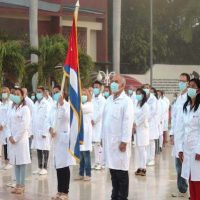

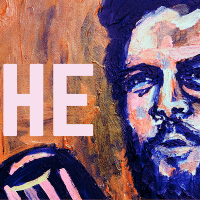

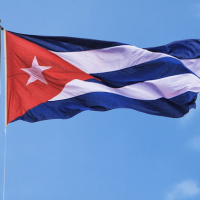

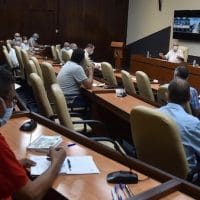


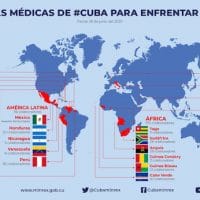
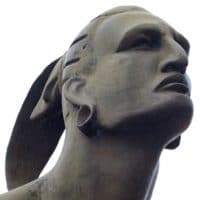

![Oslo City Hall - The place where the Nobel Peace Prize is presented Oslo City Hall (Norwegian: Oslo rådhus) houses the city council, city administration, and art studios and galleries. The construction started in 1931, but was paused by the outbreak of World War II, before the official inauguration in 1950. Its characteristic architecture, artworks and the Nobel Peace Prize ceremony, held on 10 December, makes it one of Oslo's most famous buildings. It was designed by Arnstein Arneberg and Magnus Poulsson. The roof of the eastern tower has a 49-bell carillon which plays every hour. It is situated in Pipervika in central downtown Oslo. The area was completely renovated and rebuilt to make room for the new city hall, back in the late 1920s. In June 2005 it was named Oslo's "Structure of the Century" [Wikipedia.org]](https://mronline.org/wp-content/uploads/2020/06/29879653935_b62010aaca_c-200x200.jpg)
